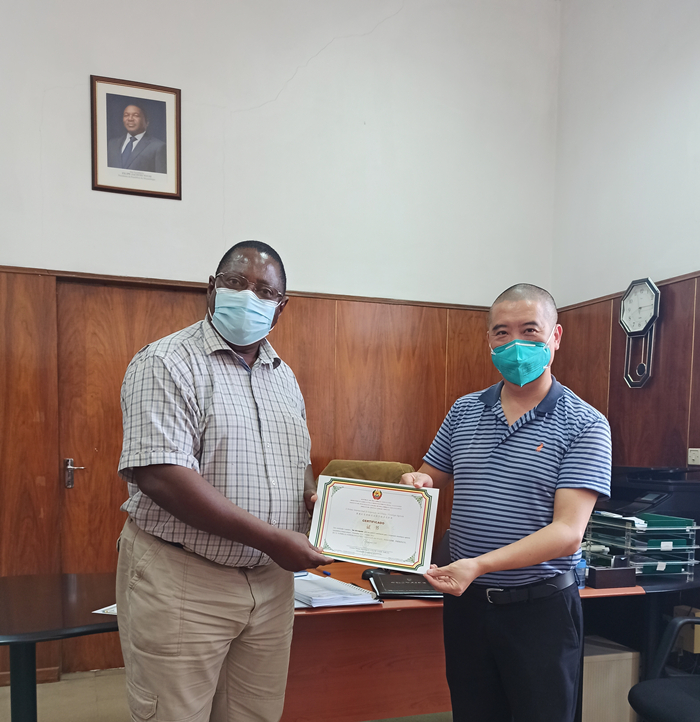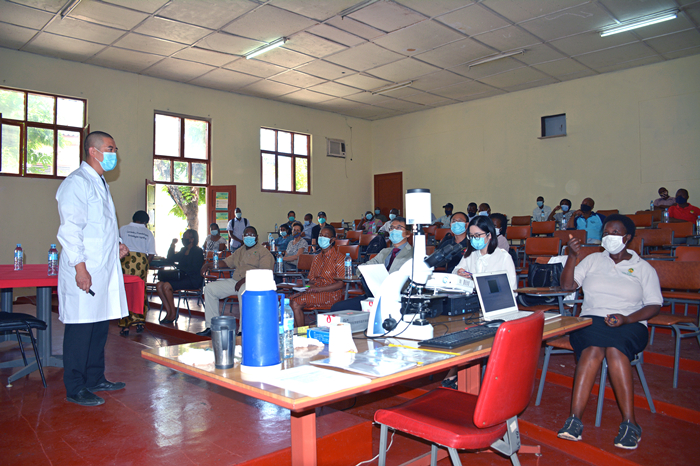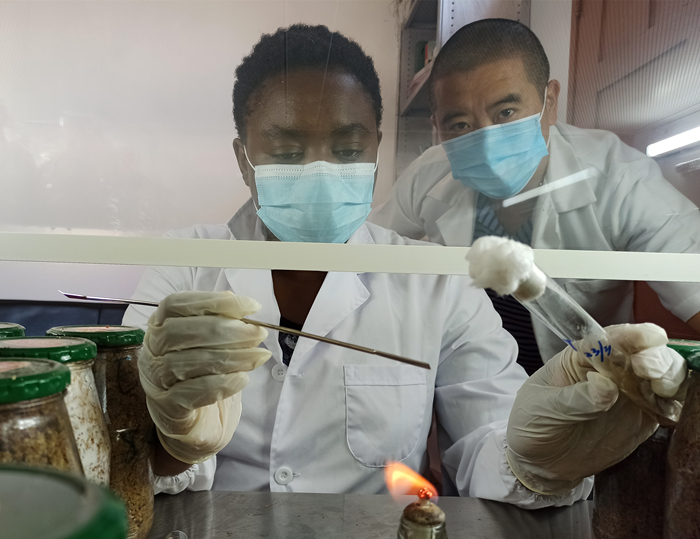|
||||||||||
| Home Nation World Business Opinion Lifestyle ChinAfrica Multimedia Columnists Documents Special Reports |
|
||||||||||
| Home Nation World Business Opinion Lifestyle ChinAfrica Multimedia Columnists Documents Special Reports |
| ChinAfrica |
| Solutions Architecture |
| Chinese expert contributes wisdom to the agricultural development in Mozambique |
| By Li Kaizhi VOL. 13 DECEMBER 2021 ·2021-12-08 |

When the breeding of guinea pigs at the Directorate began in 2019, Manuel Tchimunga treated them with great care. However, due to lack of scientific means, the survival rate of the animals was very low, making it more difficult to meet the needs of scientific research. How to provide guinea pigs with a more comfortable “home”? This was a big challenge for Tchimunga, who has rich experience in experimental animal breeding, but had no experience in designing suitable houses for the animals.
It so happened that Hu Xiaoquan, a member of Chinese agricultural expert team, had just arrived in Mozambique to start his work in the African country. Having known the difficulty that Tchimunga encountered, Hu decided to help with the building of a guinea pig house. He and Tchimunga cooperated with each other and finished two sets of modern guinea pig breeding units and cages using new resin synthetic materials.
On June 22, a patent application by Hu and Tchimunga for guinea pig breeding cages was officially approved. “The moment we received the certificate, Tchimunga was very proud to say that we had a national patent, and that we enjoyed a 15-year term of intellectual property protection,” Hu recalled. However, after a short period, Hu and Tchimunga decided to transfer the patent to Mozambique’s agricultural department free of charge, hoping to make a small contribution to the development of the local animal husbandry.
This spirit of courage, teamwork and indifference to fame has always been Hu’s credo during his years of work and life in Africa.

Hu Xiaoquan demonstrate the system for animal sperm testing at the Maputo Animal Science Directorate on November 17,2020 (ZHANG DENGXIANG)
In-depth research
Hu is no stranger to Africa. In 2004 and 2010, he participated in the first and second phases of the China-Nigeria South-South cooperation projects, and subsequently went to Ethiopia three times in the following six years to carry out vocational training, sharing agricultural knowledge with local counterparts.
Hu has spent nearly half of his 20-year working life in Africa. At the start of his current tenure as a member of the third batch of the Chinese senior agricultural expert group in Mozambique, he actively consulted with the experts of the second batch about the basic local situation, while also learning about the local agricultural development through other ways, so as to better prepare for his work.
“Our first priority is to establish a good partnership with local agricultural officials and core technical personnel, to make clear of the goals and tasks of our cooperation mission, and then sort out the existing problems and figure out solutions,” Hu told ChinAfrica.
To this end, Hu and other Chinese experts visited local research institutes and farms to conduct research for the construction infrastructure and facilities that were necessary for the development of agriculture.
“Mozambique is endowed with rich natural resources. Most areas have fertile land and suitable climate for growing a variety of crops, with 70 percent of the population engaged in agricultural production and processing work. The foundation for agriculture and animal husbandry is good and there is large potential for development,” Hu said, adding, however, that there are still problems such as lack of necessary agricultural inputs and modern technology, infrastructure, and research personnel.
Over the past three years, Hu has conducted more than 30 research studies, written six research reports on the industry, produced a variety of technical training manuals and suggestions, and actively provided agricultural technology consulting to Mozambican research institutes, farms and companies.
In view of the actual situation, Hu, who was assigned to conduct only three experimental demonstrations and five trainings, undertook a number of additional tasks. Among them, the animal sperm testing and analysis, and cultivation of edible fungi have provided greater possibilities for the growth of agricultural industry in Mozambique and improvement of rural development.

Hu Xiaoquan instructs a trainee how to inoculate edible fungi strains at the Maputo Animal Science Directorate on May 20 (COURTESY)
Filling in the blank
Technologies such as artificial insemination and embryo transfer are of great practical value for breeding good livestock and saving endangered animal species.
After preliminary research, Hu found that although Mozambique had previously used artificial insemination technology to solve animal reproduction problems, the quality of sperm was unknown, which resulted in a low reproduction rate after mating.
In order to help improve sperm testing, Hu and his local partners decided to establish a scientific and complete testing system. Using the Chinese animal sperm testing system as reference, they worked together to develop the system successfully in November 2020.
A week later, during the first animal sperm testing and analysis demonstration held at the MASD under Agricultural Research Institute of Mozambique (IIAM), the participants burst into applause when they saw animal sperm on the projection screen.
Afterwards, Mozambique’s most influential newspaper News carried a detailed article on the animal sperm testing and analysis system developed by Hu and the handover ceremony, and indicated that the practical application of the system was a historic change in the development of Mozambique’s animal husbandry.
“The system contains computer software and hardware with microscope imaging, video capture, temperature control, print imaging and other functions, which can detect and analyze animal sperm quality in a few minutes in combination with 15 indicators, and accurately assess the merits of animal sperm,” Hu said.
“This system developed through the cooperation between agricultural experts from China and Mozambique has provided advanced scientific testing means for our animal husbandry, and I would like to sincerely thank you,” Olga Lurdes Jossias Fafetine, Dean of the IIAM, said.
Similar to animal sperm testing and analysis, Mozambique has a promising future in the cultivation of edible fungi. In order to better enrich the food source of local residents and improve the diet structure, Hu decided to integrate the existing agricultural resources in Mozambique and develop and promote the Chinese fungi cultivation technology.
Hu chose to take oyster mushroom cultivation as the starting point and then carried out the demonstration of cultivation of various types of fungi. From finding inputs and selecting the optimal growth conditions, he finally cultivated the first batch of oyster mushrooms after many trials.
“Fungi cultivation can not only help develop animal husbandry, but also establish a system to ensure sustainable development,” Hu added.
Sharing the knowledge
In order to facilitate a wider application of the technology, the expert group decided to conduct technical training for their African counterparts.
“The training is mainly for senior technical leaders and technicians in the industry, teachers and students of universities. My personal focus areas are livestock breeding and edible fungi technology,” Hu said.
During the training, Hu combined theory and practice. Before the training, he prepared course materials and technical manuals for the trainees. After the class, he offered solutions to the problems encountered by the trainees in the production practice. In the past three years, Hu has conducted 13 training sessions and trained 227 people.
“I want to make this a career, also for my son and grandson,” a trainee said, “Chinese technology is simple and easy to use, and it is a good technology for us to get out of poverty and improve the environment …”
On October 7, the dean of the IIAM presented each member of the Chinese expert group with a certificate of recognition for their outstanding contribution to local agricultural development. The following day, Hu was also awarded the International Agricultural Science and Technology Cooperation Award of Mozambique by the MASD.
“Mozambique is a vast country with abundant resources, and the local agricultural development has good prospects. I wish their life will be better and better, and our friendship will last forever,” Hu said.
Comments to likzh@chinafrica.cn
|
||||||||||||
| About Us | Contact Us | Advertise with Us | Subscribe |
| Copyright Beijing Review All rights reserved 京ICP备08005356号-5 京公网安备110102005860号 |